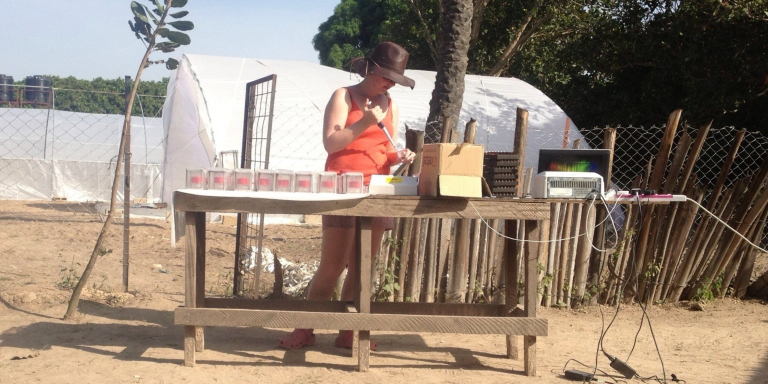Pesticides and food production in Africa- What do you think?

Building international networks to help improve pesticide use across Africa
Given RECIRCULATE’s focus on the circular water economy, you may be asking how a blog about pesticides belongs in The FLOW? Well, there are a number of reasons for that. One is that while the circular water economy may not fit my own scientific and commercial interests, RECIRCULATE’s focus on eco-innovation and building networks certainly do. Beyond that, there is the project’s focus this month on food security. That, especially the discussion around the topic in the PARTICIPATE Whatspp group, was the real stimulus for me wanting to write this piece. So what can someone from a UK-based SME (small-medium sized enterprise) bring to this discussion?
Let’s start with eco-innovation and building networks. To give you a potted biography, I did my Masters and PhD at Lancaster University. My PhD was in plant-pest interactions but then I took a side-ways step to research how crops grown in polytunnels respond to different types of cladding material. That led me to join another ex-Lancaster researcher, Dr Wagdy Sobeih, in his company Arid Agritech, which specialises in light-based eco-innovations for sustainable food production. Arid Agritech greatly values its long-term link with Lancaster University. We are co-located in the Lancaster Environment Centre and we have worked closely with Lancaster’s flagship Centre for Global Eco-Innovation (CGE) on collaborations with several Lancaster researchers.
So, in a sense, I have lived the ‘journey’ between research and research exploitation that RECIRCULATE has explored with its partners across Africa. I know first-hand the immense value of effective dialogue between researchers and research users. I see technically-aware SMEs, like Arid Agritech, as key mediators in that dialogue. I also know first- hand how being co-located on the Lancaster campus brings many benefits to an SME like Arid Agritech. It’s a great way to stay up-to-date with the relevant research environment and to link to the University’s wider networks. That’s how I became aware of RECIRCULATE, and that’s what brings us back to pesticides.
Being based in LEC gave me the opportunity to meet with some of the RECIRCULATE residents when they were based at Lancaster. That was a huge opportunity for Arid to learn more about the challenges facing food production in sub-Saharan Africa. One thing I learned about was the pressing need for effective pest control. That’s partly driven by the current major multi-national challenges of the worst locust outbreaks in decades and the scourge of armyworm. Related to that was the concern that chemical pesticides although vital, may be being used inappropriately in some situations. That last point brought a new understanding of a challenge that I had heard about before from Prof Cris Halsall, one of LEC’s environmental chemists.
Arid Agritech has been developing a new collaboration with Cris that’s focussed on how pesticides break-down in different locations with contrasting levels of sunlight. We want to apply that knowledge to develop a web-based “pesticide break-down tool”. As the name suggests, this will predict how quickly a pesticide will be broken-down on crops- which we see as having great commercial potential for farmers. It will allow them to more accurately understand the safe period between pesticide application and harvesting to avoid unwanted residues in their crops, especially fresh produce like fruit, vegetables and salads.
What my meetings with the RECIRCULATE residents brought in to sharp focus was what Cris had told me about his long-standing collaboration with Dr Justina Ukpebor at University of Benin. University of Benin is a key partner in the RECIRCULATE project, and through the project, Cris also developed links with Dr Edu Iman at Oyo University. Working together, and with Ekeoma Ogwo, a PhD student at Lancaster University, the team surveyed hundreds of smallholder farmers in southern Nigeria to understand the type of pesticides used and how they are applied and stored. Whilst the results of the survey are complex, they confirm that smallholder farmers are increasingly using a wide variety of chemicals (insecticides, herbicides etc.) often sourced from local markets. As others have found, it also seems that unintentional misuse is commonplace and that label instructions regarding correct application and dose are not always followed. That’s a worry, because if not used or stored properly, these chemicals can lead to health problems for farm workers and their families, with residues ending up on foodstuffs as well as contaminating the environment.
With that in mind, my discussions with the RECIRCULATE residents were something of a ‘Eureka moment’ for me. We’d been thinking about our pesticide break-down tool as useful mostly to large scale growers, particularly in greenhouses and polytunnels. That’s always going to be important for us- Arid Agritech is a business and that will be our commercial product. But what if we could also make some form of the tool available to help small-holders use pesticides more efficiently and more safely? What if could make a simple version of the tool available free to anyone with a mobile phone or via a text messaging service? Would that help ‘make a difference’ to pesticide use in African countries?
That’s not a rhetorical question: Cris and I would really like to know what you think. The excellent recent contribution to The Flow by Stephen Yeboah and Patricia Oteng-Darko highlights that “its good to listen”.We agree- so we are listening. Do you agree that pesticide misuse is a problem? Would a mobile phone based “information system” be accessible and useful “in, with and for” the communities that you work with? It’s also a real question because I think there are opportunities to make this technology real. It seems likely that UK funding might become available to allow a company like Arid Agritech to work with research partners in the UK and in Africa on new technologies that would have commercial value, but much more than just that. Your insights will help us work out the best way to put this technology into the hands of the people who need it most across the African continent.
 |
Dr Jason Moore is Research Director Arid Agritec based at Lancaster Environment Centre where he’s also an Honorary Researcher. His commercial interests are focused on developing transformative technologies for increasing yields / quality and reducing chemical inputs in global agri-hort. Jason has a BA(hons) in Economics from Leeds University and an MSc (Environmental and Ecological Science) and PhD (Plant Science) from Lancaster University. He developed links with a number of RECIRCULATE Fellows when, during their visit last year, they became interested in a technology he developed with his PhD supervisors for a radical approach to protecting major food crops from pest attack which could offer farmers around the globe an environmentally sustainable approach to crop protection. Alongside the project detailed in this blog he is currently working with those Fellows to test that technology against Armyworm which is becoming a major problem in the region. |
All articles in The FLOW are published under a Creative Commons — Attribution/No derivatives license, for details please read the RECIRCULATE re-publishing guidelines.
